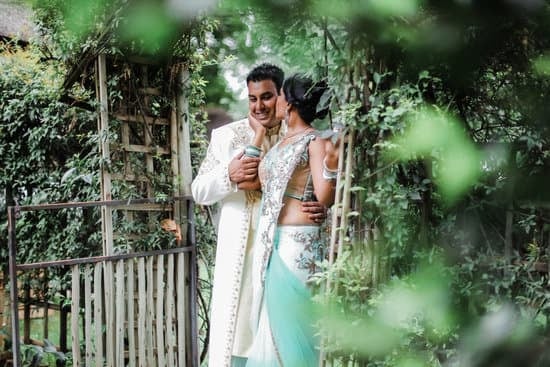Are you wondering what to wear to a Jewish wedding? Attending a Jewish wedding comes with its own set of dress codes and expectations, and it’s important to understand the cultural and religious significance behind them.
In this article, we’ll explore the traditional attire for both men and women, as well as provide tips on how to dress appropriately for the ceremony while still expressing your personal style. From covering shoulders and knees to choosing the right colors, we’ll guide you through navigating the dos and don’ts of Jewish wedding attire so you can celebrate in style while respecting tradition.
Jewish weddings are steeped in tradition and have specific dress codes that guests are expected to adhere to. It is important to understand the significance behind these dress codes in order to show respect for the bride, groom, and their families. Additionally, understanding the cultural sensitivities associated with Jewish wedding attire will help ensure that you make a positive impression at the celebration.
In this article, we will delve into traditional Jewish wedding attire for both men and women. We will explore the expectations surrounding modesty, covering shoulders and knees, as well as provide guidance on choosing the perfect head covering or kippah. Whether you are attending a traditional or modern Jewish wedding, it’s crucial to strike a balance between embracing tradition and expressing your personal style – and we’re here to help you do just that.
Traditional Jewish Wedding Attire
When attending a Jewish wedding, it is important to be aware of the traditional attire expectations for both men and women. Understanding and respecting these expectations will not only show your consideration for the couple and their families but also help you feel more comfortable and confident in your outfit choice.
Expectations for Men
For men attending a Jewish wedding, the traditional attire typically includes a suit and tie. It is important to choose a formal suit in dark or neutral colors, such as black, navy, or grey. Additionally, it is customary for men to wear a kippah, also known as a yarmulke, during the wedding ceremony. If you do not have one, they are often provided at the venue.
Expectations for Women
Women attending a Jewish wedding should opt for modest and respectful attire. This means choosing dresses or skirts that cover the knees and shoulders. It is best to avoid sheer fabrics and low-cut necklines. Additionally, wearing a head covering such as a hat or fascinator can be a thoughtful way to show respect for the traditions of the ceremony.
Adhering to Tradition With Personal Style
While it is important to adhere to the traditional dress code for a Jewish wedding, there is still room for personal style. Men can express their individuality through their choice of tie or pocket square, while women can play with different textures and accessories that complement their outfit without compromising modesty. Remember, you can embrace tradition while still showcasing your unique style at a Jewish wedding.
Modest and Respectful
When attending a Jewish wedding, it is important to dress modestly and respectfully, keeping in mind the religious significance of the ceremony. Dressing appropriately shows respect for the couple getting married and their families, as well as for the traditions and customs of the Jewish faith. Understanding the dress code and expectations for attire can help ensure that you are dressed appropriately for this special occasion.
For Women
Women attending a Jewish wedding should choose attire that is modest and conservative. This means opting for dresses or skirts that fall below the knee and tops with sleeves that cover the shoulders. It is also customary for women to cover their heads during the ceremony, so consider wearing a stylish hat or a tasteful headscarf. When selecting your outfit, avoid anything too revealing or flashy, as it is important to show respect for the sanctity of the ceremony.
For Men
Men should also dress modestly and respectfully for a Jewish wedding. This typically means wearing a suit or at least a dress shirt and trousers. A tie is usually expected, and it is customary for men to wear a kippah (yarmulke) on their heads during the ceremony. When choosing your attire, opt for traditional colors like black, navy, or dark gray, and avoid patterns or fabrics that may be considered too casual.
Exploring these guidelines can help you navigate what to wear to a Jewish wedding in a way that shows respect for tradition while allowing you to express your personal style. By dressing modestly and thoughtfully, you can honor this meaningful celebration while feeling comfortable and confident in your chosen attire.
The Importance of Covering Shoulders and Knees
When attending a Jewish wedding, it is important to understand and adhere to the traditional dress code, which often includes covering shoulders and knees. For women, this means opting for a dress or skirt that falls below the knee and choosing a top that covers the shoulders.
It is also customary to avoid low-cut or revealing outfits out of respect for the religious significance of the ceremony. When selecting a dress for a Jewish wedding, it is essential to prioritize modesty and elegance.
Men attending a Jewish wedding are expected to wear suits that cover their knees while seated and shirts that cover their shoulders. While there may be some variation in specific customs depending on the sect of Judaism, it is generally recommended for men to opt for a well-fitted suit in dark colors such as black, navy, or charcoal gray. Additionally, it is customary for men to wear a kippah, or yarmulke, as a sign of reverence during the ceremony.
It’s important to keep in mind that adhering to these guidelines not only demonstrates respect for tradition but also shows consideration for the couple getting married and their families. By dressing appropriately in accordance with these customs, guests can ensure they are honoring this special occasion while expressing their personal style within the parameters of tradition.
In essence, finding the right dress or suit means striking a balance between respecting cultural norms and feeling comfortable and confident in one’s attire at a Jewish wedding.
Accessorizing for a Jewish Wedding
When attending a Jewish wedding, it is important to be mindful of the traditions and customs that are part of this special occasion. One traditional accessory that is commonly worn by men at a Jewish wedding is the kippah, also known as a yarmulke.
This small cap symbolizes reverence and respect for God, making it an essential part of the attire for many Jewish men. When choosing a kippah to wear to a Jewish wedding, consider the following tips:
- Consider the Material: Kippot come in a variety of materials, including velvet, satin, suede, and knit. Consider the formality of the wedding and your personal style when choosing the material for your kippah. For more formal weddings, opting for a velvet or satin kippah can add an elegant touch to your attire.
- Choose a Meaningful Design: Kippot are available in various designs and colors, so consider selecting one with special meaning or significance to you. Some couples choose matching kippot as wedding favors for their guests, so wearing this gift can be a meaningful way to honor the couple on their special day.
- Proper Placement: When wearing a kippah at a Jewish wedding, it should be placed on the top of your head as a sign of respect. Ensure that it is secure and does not fall off during any celebratory dancing or activities.
In addition to the kippah, women attending a Jewish wedding may also wear head coverings out of respect for the traditions of modesty. While specific customs may vary among different sects and communities within Judaism, some women choose to wear stylish hats or decorative hair coverings such as tichels or fascinators.
Understanding these cultural nuances will help you navigate what to wear to a Jewish wedding while embracing tradition and expressing your personal style at this joyous celebration. Whether you opt for traditional or modern accessories, showing respect for Jewish customs will be appreciated by the hosts and other guests at the wedding.
Choosing the Right Colors
When attending a Jewish wedding, it is important to consider the significance of certain colors in Jewish tradition. Traditionally, certain colors are avoided at weddings due to their association with mourning. This includes the color black, as well as other dark and somber tones. Instead, it is customary to wear bright and joyful colors that symbolize celebration and happiness.
For women, vibrant hues such as deep purples, blues, and greens are popular choices for dresses. These colors not only align with traditional Jewish wedding customs but also convey a sense of elegance and sophistication. Men can also incorporate these vibrant colors into their attire through accessories such as ties or pocket squares.
In addition to traditional color choices, modern approaches to wedding attire have allowed for more flexibility in color selection. While brightly colored attire is still encouraged, modern Jewish weddings often see guests wearing a wider range of colors, including pastels and even some muted tones. The key is to strike a balance between respecting tradition and expressing personal style.
Ultimately, when choosing the right colors to wear to a Jewish wedding, it is essential to consider both traditional customs and personal preferences. By embracing joyful and vibrant colors while being mindful of cultural traditions, guests can ensure that they are dressed appropriately for the occasion.
| Traditional Colors | Modern Approaches |
|---|---|
| Bright purples | Wider color range including pastels |
| Deep blues | Incorporating muted tones |
| Vibrant greens | Flexibility in color selection |
The Reception Look
After the ceremony, it’s time to transition to the reception and continue celebrating the joyous occasion. When considering what to wear to a Jewish wedding reception, it’s essential to strike a balance between formal and comfortable. Many guests opt for a more relaxed outfit for the reception, especially if it involves dancing and socializing.
For women, this could mean swapping out a long dress for a shorter, more movable one or adding a stylish jacket or shawl over their ceremony dress. It’s also common for women to change into dressy flats or comfortable heels that allow them to dance the night away without sacrificing style. For men, switching from a formal suit to a dress shirt with trousers is an acceptable option for the reception.
Additionally, guests should be mindful of any religious customs or traditions that may be observed during the reception, such as separate seating for men and women in Orthodox Jewish weddings. It’s important to be respectful of these customs while enjoying the celebration. By being considerate of these cultural sensitivities, you can ensure that your attire is appropriate for both the ceremony and the reception.
| Attire Option | Description |
|---|---|
| Women: Shorter or convertible dress | A shorter, more movable dress or a convertible dress that can transform from formal to casual. |
| Men: Dress shirt with trousers | Switching from a full suit to just a dress shirt paired with trousers for comfort. |
| Mindful Attire | Being aware of any religious customs during the reception and dressing accordingly. |
Navigating Cultural Sensitivities
Attending a Jewish wedding is a significant experience that requires careful consideration of attire. It is important to understand the cultural sensitivities surrounding Jewish wedding attire in order to avoid any potential faux pas. While the dress code for Jewish weddings may vary depending on the specific customs of the couple or their families, there are general dos and don’ts that should be observed.
One important dos of Jewish wedding attire is dressing modestly. For women, this means choosing a dress or skirt that covers the knees, and ensuring that shoulders are covered as well. Men should opt for suits or dress pants with a button-up shirt.
It is also customary for men to wear a kippah, also known as a yarmulke, during the ceremony and reception. This small cap holds great significance in Jewish culture and should be worn at all times during the wedding festivities.
On the other hand, there are certain don’ts to keep in mind when selecting attire for a Jewish wedding. It is not appropriate to wear clothing that is overly revealing or flashy. This means avoiding plunging necklines, short hemlines, or anything too form-fitting.
Additionally, it is considered disrespectful to wear white, as it may detract attention from the bride who traditionally wears white on her wedding day. By understanding these dos and don’ts of Jewish wedding attire, you can ensure that you show respect for tradition while still expressing your personal style.
In navigating cultural sensitivities pertaining to Jewish wedding attire, it is important to remember that every decision regarding what to wear should be made with sensitivity and respect for the traditions of the couple getting married. By adhering to modesty guidelines and avoiding clothing that may be considered inappropriate or distracting, you can show your support and respect for the couple’s special day while celebrating their traditions and culture with them.
Conclusion
In conclusion, attending a Jewish wedding is not only a celebration of love and unity but also an opportunity to embrace tradition and express personal style through your attire. Understanding the dress code for such an occasion is essential in order to show respect for the cultural and religious significance of the event. Whether you are a man or woman, it is important to dress modestly and respectfully for the ceremony, covering shoulders and knees as a sign of reverence.
When considering what to wear to a Jewish wedding, it is crucial to find the right balance between traditional expectations and modern approaches to wedding attire. For women, choosing a dress that covers the shoulders and knees is key, while men should opt for a suit in appropriate colors. Additionally, accessorizing with the perfect head covering or kippah can add a touch of personal style while adhering to tradition.
Transitioning from the ceremony to the reception also requires careful consideration of cultural sensitivities. It’s important to respect any specific dos and don’ts when it comes to Jewish wedding attire in order to fully honor the couple’s special day. By embracing tradition while expressing personal style at a Jewish wedding, you can contribute to the joyous atmosphere of this meaningful event.
Frequently Asked Questions
What Should a Woman Wear to a Jewish Wedding?
A woman attending a Jewish wedding should opt for modest and conservative attire. This usually means choosing a dress or outfit that covers the shoulders, knees, and elbows as a sign of respect for the religious ceremony.
What Colour Do You Wear to a Jewish Wedding?
When it comes to color choices for a Jewish wedding, guests should avoid wearing white since it is traditionally reserved for the bride. It’s also best to steer clear of black, as it is often associated with mourning or somber occasions in Jewish culture.
What Do Jews Wear to a Wedding?
For a Jewish wedding, guests typically dress in formal attire, with men wearing suits and women choosing dresses or pantsuits. The key is to select outfits that are tasteful and respectful of the traditions being celebrated during the ceremony.

I have been involved in marriages for over 20 years helping couples and singles understand more about them.





